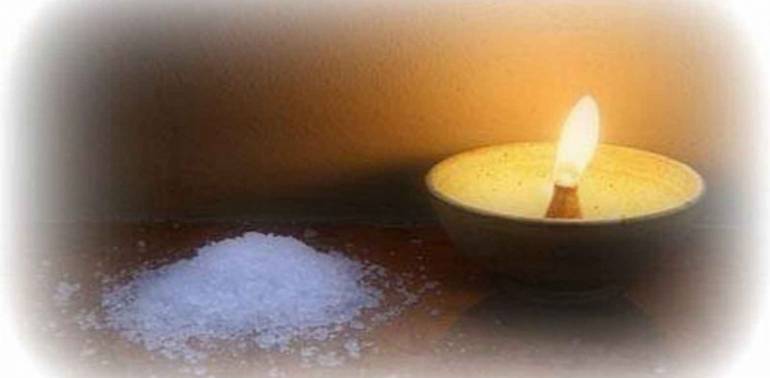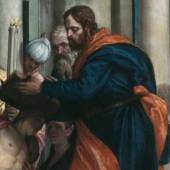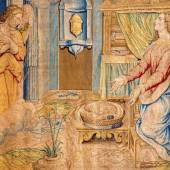“You are the salt of the earth … You are the light of the world," (Mt 5:13-16)

“You are the salt of the earth … You are the light of the world,” Matthew 5,13-16.
A. Text:
“You are the salt of the earth. But if salt loses its taste, with what can it be seasoned? It is no longer good for anything but to be thrown out and trampled underfoot. You are the light of the world. A city set on a mountain cannot be hidden. Nor do they light a lamp and then put it under a bushel basket; it is set on a lampstand, where it gives light to all in the house. Just so, your light must shine before others, that they may see your good deeds and glorify your heavenly Father.”
B. Setting:
Moses received the Law on a mount. Now Jesus the New Moses goes up a mountain and starts a sermon.
The sermon is addressed directly, specifically and personally to His disciples as He calls them “you” and “your.” The Jewish crowds too hear it. “When he saw the crowds, he went up the mountain, and after he had sat down, his disciples came to him” (5,1); When Jesus finished these words, the crowds were astonished at his teaching” (7,28). The new values of the Kingdom are given directly to the disciples. That’s because it is they who have opted for Jesus and his Kingdom.
Similarly, today, this Sermon on the Mount is directly addressed to us, the Christians.
C. Message:
The New Moses speaks to us in metaphorical language. Employing the homely metaphors of salt and lamp, He says the following:
i. You, my disciples of all ages, have an exalted vocation for the world, although you may be persecuted. That is, you are the salt of the earth and the light of the world. Now live this vocation in the world. Be this salt and light with your good works effectively. Influence the world for good. Improve the quality of human existence and preserve it from destruction. Your actions serve as a beacon of light in a dark world.
ii. The sole purpose of it should be that others may see your good works and glorify your Father in heaven.
iii. You being my disciples in the world cannot escape notice just as “a city set on a mountain cannot be hidden.” You should not shrink from your world mission. Live for others like a lamp set on a lampstand and gives light to all in the house.
iv. But if you fail in good works, you are as useless as flavourless salt or as a lamp whose light is hidden under a measure. The fate of salt will be God’s judgment on you – “It is no longer good for anything but to be thrown out and trampled underfoot ... Nor do they light a lamp and then put it under a bushel.”
D. Analysis of the Message:
i. Salt
Jesus employs the homely metaphors of salt and lamp. Salt was often costly. But its value was so much. “Nothing is more useful than salt or sunshine” as Pliny said (National History, 31.102).
a. Salt improves the taste of food as spice: “can a thing insipid be eaten without salt? Is there flavor in the white of an egg?” (Job 6,6).
b. Salt preserves food like meat and fish as well.
c. As salt was an important part of the daily diet in ancient times, it was used as a covenant sign. To eat salt with a person meant to share his or her hospitality. So when covenants were made, salt was there to season the sacrificial meals which confirmed the covenant: “By perpetual ordinance I have assigned to you and to your sons and daughters all the contributions from the sacred gifts which the Israelites make to the LORD; this is an inviolable covenant of salt to last forever before the LORD, for you and for your descendants” (Numbers 18,19).
d. Salt was also required for sacrifices to the Lord: “However, every cereal offering that you present to the LORD shall be seasoned with salt. Do not let the salt of the covenant of your God be lacking from your cereal offering. On every offering you shall offer salt” (Leviticus 2,13).
Strictly speaking, salt cannot lose its flavor and remain salt. But Jesus speaks of something unusual, “but if salt loses its taste, with what can it be seasoned?” What could be the origin of this quite unusual supposition? Most of the salt used in Israel came from the Dead Sea. The flavourless salt could refer to such salt of the Dead Sea that could lose its taste being chemically impure.
ii. A city set on a mountain
Nazareth, Hippos and Jerusalem are hilltop cities in Jesus’ Land.
“A city set on a mountain cannot be hidden” could be a popular wise saying. The Christian disciples are a city set on a mountain. They are so obvious. They stand out like a sore thumb. Everyone can see them as quite different from others. They can hardly escape notice.
iii. Lamp & Lampstand
“Nor do they light a lamp and then put it under a bushel basket; it is set on a lampstand, where it gives light to all in the house.”
lamp = a small and common clay lamp that burns olive oil drawn up by a wick.
bushel basket = a vessel used to measure grains
How can a small clay lamp give light to all in the house?
a. The house should be a one room house of a Palestinian peasant.
b. As the lamp gives off only modest light, it could be strategically positioned for maximum benefits. It was placed on a lampstand, often a niche built into a wall.
Jews were accustomed to burning lamps overnight in their chambers (Matthew 5,15; Mark 4,21; Luke 8,16; 11,33; 15,8). Why? They dreaded darkness. They also wanted to keep away prowlers.
In Matthew, Jesus is the light, “the people who sit in darkness have seen a great light, on those dwelling in a land overshadowed by death light has arisen” (4,16). Now Christians are the light. They are the lamp set on lampstand that gives light to all household. They are to live for others.
iv. Good works
Jesus explains what these homely metaphors of salt and lamp mean. “Just so, your light must shine before others, that they may see your good deeds and glorify your heavenly Father.” They are the good deeds of His disciples.
How can the disciples be the salt of the earth? How can they be the light of the world? What are the good works through which God is glorified? The rest of the Sermon on the Mount will elaborate (Matthew 5 – 7). It will describe the life of discipleship. This small passage (vv.13-16) is only the introduction to it. We will hear the modus operandi on Sundays to come.
v. Theocentricism
Jesus’ message is neither ecclesiocentric (Church centered) nor Christocentric (Christ centered) but strictly Theocentric (God centered). Others may see the witness of the Disciples of Christ – “good works” – and glorify the Father in heaven – “… and glorify your heavenly Father.” Christ seems to be leading them to God whom He addresses now as Father.
Jesus maintains a delicate balance between doing good works and not being proud or arrogant or taking the credit. The good works of the disciples should convert many to God the Father. Every good deed we do is solely, as phrased by St. Ignatius of Loyola, ‘ad majorem Dei gloriam’ (‘to the greater glory of God’).
Radio Veritas Asia (RVA), a media platform of the Catholic Church, aims to share Christ. RVA started in 1969 as a continental Catholic radio station to serve Asian countries in their respective local language, thus earning the tag “the Voice of Asian Christianity.” Responding to the emerging context, RVA embraced media platforms to connect with the global Asian audience via its 21 language websites and various social media platforms.














